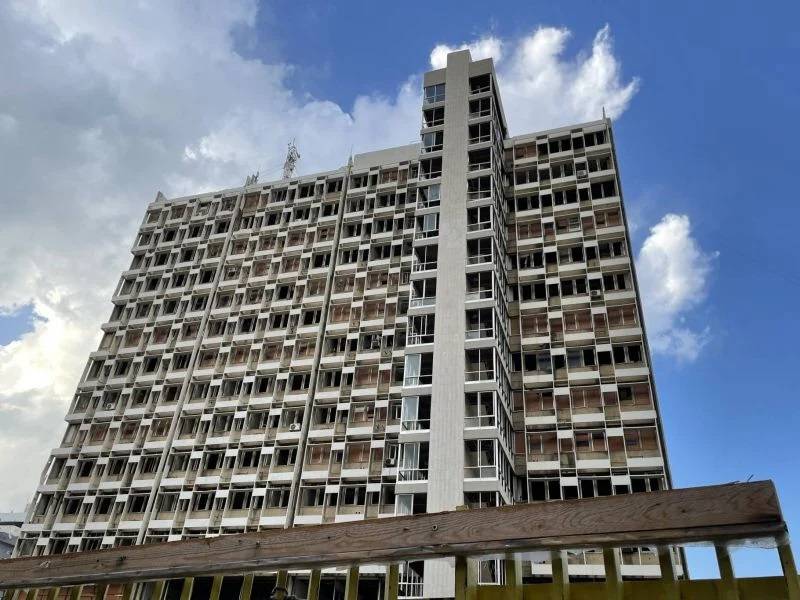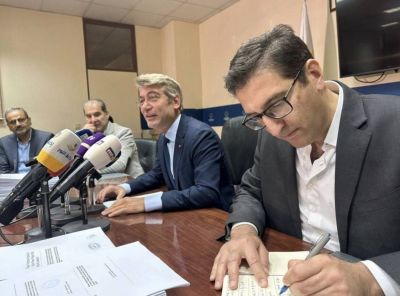
Electricité du Liban's headquarters in Beirut. (Credit: Philippe Hage Boutros/L'Orient-Le Jour)
BEIRUT — The Deir Ammar and Zahrani power plants — the country's two largest — will resume generating electricity on Thursday, fewer than 24 hours after being shut down by Primesouth Lebanon, the operator responsible for running them on behalf of Électricité du Liban (EDL).
The breakthrough was confirmed to L'Orient-Le Jour by caretaker Prime Minister Najib Mikati, by a spokesman for EDL and by a source in Primesouth Lebanon's management who requested anonymity as he was not authorized to speak to the press.
Primesouth Lebanon — the local sister company of a US energy management firm — has managed the Deir Ammar and Zahrani plants since 2016. It halted operations at the two sites earlier this week over unpaid dues owed by EDL.
Mikati said he intervened to secure $7 million would finally be transferred to the company to settle part of the debt. The money would be taken from the remaining amounts from the International Monetary Fund's (IMF) special drawing rights, which were released in September 2021 and are unrelated to any assistance program financed by the organization.
According to a press release issued on Thursday by Banque du Liban (BDL), Lebanon still had, as of July 31, $125 million of the $1.135 billion initially allocated by the IMF.
The "verbal" agreement between the Prime Minister and Primesouth Lebanon's management also provides for the repayment of arrears to be spread over several months, according to press reports. These total payments would exceed $100 million, according to a source at EDL who was not authorized to speak to the press.
Plants restarted
Primesouth Lebanon began restarting the power plants between 2 and 3 p.m. Thursday, but according to the EDL spokesperson, this operation may take several hours to complete.
Once the process is finished, EDL will resume supplying Lebanese households with the few hours of power a it manages to provide per day.
Primesouth Lebanon had been warning EDL for a week that it would cease operations scheduled on Wednesday, Aug. 16 at 5 p.m. if no payments were made in its favor by then. Its contract, recently extended, does not expire until July 2024.
In a press release issued after the threat, EDL indicated that it had approached BDL in an attempt to obtain the sum and release $10 million in funds gathered via electricity bill collection.
However, BDL refused to convert and transfer the requested funds, following a firm stance taken by the acting governor, Wassim Mansouri. Discussions were held, notably with the caretaker energy minister from Wednesday evening to Thursday afternoon, until the announcement of the agreement.
Samir Geagea reacts
Lebanese Forces leader Samir Geagea criticized the government's handling of the issue in a statement relayed by the state-run National News Agency.
"As always, the government is waiting until the last moment to force citizens to choose between no longer having public electricity or having to pay out of their own pockets, via the central bank," to keep the sector running, Geagea said.
Denouncing an "unacceptable method," Geagea also accused the Finance Ministry (headed by Youssef Khalil, who is affiliated to the Amal Movement) and Energy Ministry (in the hands of Walid Fayad, close to Gebran Bassil's Free Patriotic Movement) of wasting public funds by encouraging "deadly stagnation" on this issue.
Finally, he called on the government to force administrations and institutions to settle their debts with EDL.
Failure to reach an agreement would result in EDL subscribers becoming totally dependent on private generators and other means of electricity production, and would permanently interrupt the supply of public electricity to infrastructures such as the airport, the port and the water establishments.
Caretaker Public Works Minister Ali Hamieh, wrote on X (formerly Twitter),after the cabinet meeting Thursday evening that "emergency lines have been deployed at the Beirut airport and Beirut port to supply them with electricity." Passengers complained since Wednesday of power outages at the airport, forcing them to wait in line in the dark.
"The officials concerned must understand that power must not be cut, even for a minute, to these essential public infrastructures," he added.
The South Lebanon Water Establishment announced on Thursday morning that its main stations, wells and distribution centers would no longer supply running water, following the shutdown of its power plants, which alone account for more than half the country's production capacity (900 megawatts).
These two production sites were also the only ones to have been operating for at least several months, even if not at full capacity, given EDL's fuel supply problems.
